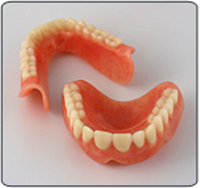|
• Feel
 You will notice right away that your new dentures seem very
large in your mouth. You may even experience a gag reaction
to their fullness, particularly in the back of your mouth.
This is a normal first reaction. Be patient. In time, with
a little practice, you will adjust naturally to this initial
fullness, and barely notice them in your mouth.
You will notice right away that your new dentures seem very
large in your mouth. You may even experience a gag reaction
to their fullness, particularly in the back of your mouth.
This is a normal first reaction. Be patient. In time, with
a little practice, you will adjust naturally to this initial
fullness, and barely notice them in your mouth.
• Excessive Saliva
When you first received your new dentures, you probably noticed
an increase in the flow of saliva in your mouth. Again, this
is a normal response to the unfamiliar object in your mouth,
namely the denture. On average, most of us swallow about six
hundred times a day. For the first few days of wearing your
new dentures, you should try to swallow more frequently. In
a few days (sometimes in just a few hours) , your mouth will
become accustomed to the dentures and saliva flow will return
to normal.
• Speaking
Many new denture wearers have difficulty with their speech
at first. A common problem is pronouncing words containing
"s" sounds. In most cases, practicing speech aloud
with your new dentures in place will help restore your normal
speaking quality quickly. One of the best practice methods
is to read aloud from a book or magazine in front of a mirror
to get used to the new speaking position of your tongue and
new teeth. This will add confidence and comfort. Another good
habit is to bite and swallow prior to speaking to "set"
the dentures in position to improve clarity.
• Eating
A basic fact of denture life is that you will not be able
to bite down as hard as you could with natural teeth. Therefore,
you can no longer chew in quite the same way. People with
natural teeth chew on one side of the mouth and then on the
other side. With dentures, you must take smaller bites and
learn to chew on both sides of the mouth at the same time
to prevent the dentures from rocking and dislodging. Here
again it is just a matter of patience and practice before
you will be eating your favourite foods without difficulty.
• Maintaining Good Nutrition
One of the most critical areas of Denture After-Care is the
maintenance of oral tissue and the ridge of bone that supports
the dentures. The state of the health is directly influenced
by diet and nutrition. So make sure you eat balanced meals
and get the proper amounts of vitamins and minerals each day.
We will be happy to give you nutritional advice if you have
any questions about your diet.
• Denture Care
The supporting bone and tissue in your mouth need regular
rest from denture wearing. Therefore it is important that
you take your dentures out everyday for a brief time or overnight.
The best place to store them is in a special water filled
plastic container called Denture Bath. This procedure will
prevent your dentures from drying out which can, adversely
affect their fit.
|


 You will notice right away that your new dentures seem very
large in your mouth. You may even experience a gag reaction
to their fullness, particularly in the back of your mouth.
This is a normal first reaction. Be patient. In time, with
a little practice, you will adjust naturally to this initial
fullness, and barely notice them in your mouth.
You will notice right away that your new dentures seem very
large in your mouth. You may even experience a gag reaction
to their fullness, particularly in the back of your mouth.
This is a normal first reaction. Be patient. In time, with
a little practice, you will adjust naturally to this initial
fullness, and barely notice them in your mouth.